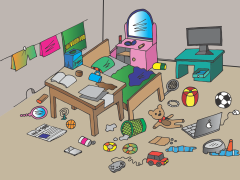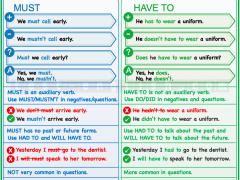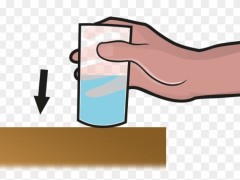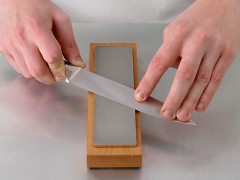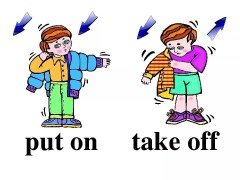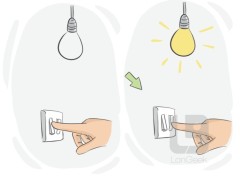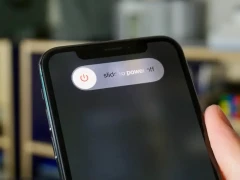shut [ʃʌt] v. 关门
bedroom [ˈbedrum] n. 卧室
untidy [ʌnˈtaidi] adj. 乱的,不整洁的
【构】un(表示否定意义的前缀)+tidy(整洁的)=untidy(不整洁的)
【扩】tousy 凌乱的
* * *
A: How can you live in such an untidy room?
B: I really have no time to clean it.
A:你怎么能住在这么乱的房间里面?
B:我确实没时间去整理。
* * *
must [mʌst] modal verb 必须,应该
open [ˈəupən] v. 打开
【派】opening 孔,口子 opener 开启工具
【反】close 关上
* * *
A: When will the museum open today?
B: Unfortunately, it is closed today.
A:博物馆今天几点开馆?
B:很遗憾,今天闭馆。
* * *
air [ɛə] v. 使……通风,换换空气
put [put] v. 放置
【搭】put on 穿上 put up 举起
put off 推迟 put out 扑灭
* * *
A: Put it in that corner, please.
B: I can't lift it. It's so heavy.
A:请把它放到那个角落去。
B:我提不动,它太重了。
* * *
clothes [kləuðz] n. 衣服
wardrobe [ˈwɔːdrəub] n. 衣柜
dust [dʌst] v. 弹掉灰尘
【派】dusting 清扫 dustless 无尘的
* * *
A: Please dust the shelves.
B: OK. I'll finish it soon.
A:请掸掸柜子上的灰。
B:好的,马上完成。
* * *
sweep [swiːp] v. 扫
【派】sweeping 清除,清扫
【扩】broom 扫把
【搭】sweep off 拂去 sweep away 驱散
* * *
A: Can you sweep the floor for me?
B: OK. Pass me the broom.
A:能帮我把地扫扫吗?
B:好的,把扫把递给我吧。
Lesson 30 What must I do? 我应该做什么?
empty [ˈempti] v. 倒空;使……变空
【派】emptying 倒空
* * *
A: Empty the bowl and wash it.
B: Why don't you do it yourself?
A:把碗里的东西倒了,再把碗给洗了。
B:你为什么不自己去做呢?
* * *
read [riːd] v. 读
【派】reading 阅读 reader 读者
【扩】peruse 熟读,阅读
【搭】read books 看书
* * *
A: What's your hobby?
B: I like reading very much.
A:你的爱好是什么?
B:我很喜欢阅读。
* * *
sharpen [ˈʃɑːpən] v. 削尖,使锋利
put on [ˈput-ɔn] 穿上
【搭】put on weight 增加体重
* * *
A: Put on your coat. It's cold outside.
B: I didn't bring a coat with me at all.
A:把你的外套穿上,外面冷。
B:我压根就没带外套来。
* * *
take off [ˈteik-ɔf] 脱掉
turn on [ˈtəːn-ɔn] 开(电灯等)
turn off [ˈtəːn-ɔf] 关(电灯等)
* * *
A: Turn off the television. I don't want to watch it now.
B: But where is the remote control?
A:把电视关了吧,我不想看了。
B:但是遥控器在哪儿呢?
verb [vt. 及物动词]关闭,合上;把…关在;<英>(使)停止运作,(使)停止营业;禁止通行,封闭 - Just make sure you shut the gate.
adjective [原级]关闭的,关上的;<英>打烊的,停止营业的 - She was silent for a moment, lips tight shut, eyes distant.
noun [抽象名词]关闭 - I don't have to tell you how important it is for you to keep your mouth shut about all this.
noun [专属名词]卧室 - The main bedroom is enormous.
adjective [原级]两性关系的;城郊住宅区的 - This town is becoming a bedroom community of Columbus, 20 miles to the north.
adjective [原级]不整洁的,凌乱的;懒散的;不干净利落的,不简练的;不适宜的 - My room looks very untidy.
verb [vt. 及物动词]使不整洁;使杂乱无章 - His uniform was crumpled and untidy.
adjective [原级]整洁的,有条理的;(人)爱整洁的,爱整齐的;<非正式>(款额)巨大的;相当好的,令人满意的 - Something that is tidy is neat and is arranged in an organized way.
verb [vt. 及物动词]使整洁,整理 - When you tidy a place such as a room or cupboard, you make it neat by putting things in their proper places.
noun [抽象名词]盛零碎物品的容器;<英>整理,收拾;<美>(椅子靠背的)罩单,套子 - I'm very impressed by your tidiness and order.
verb [情态动词](表示必要或很重要)必须;(用于表示肯定推测)一定,谅必;(提出建议)应该;(用于表示意图)一定要,坚持要;(用于表示同情)必定;(用于问句中表示生气)非要 ;(用于感叹句,表示惊讶或震惊)一定是 - You use must to indicate that it is necessary for something to happen, usually because of a rule or law.
noun [抽象名词]<非正式>必不可少的事物;(发酵前或发酵中的)葡萄汁;潮气,霉菌;(尤指发情期的公象、雄骆驼等的)狂暴状态(=musth) - If you refer to something as a must, you mean that it is absolutely necessary.
adjective [原级]开放的,营业的;开着的,敞开的;(身体部位)张开的;未封的;未系好的,未扣上的;露天的;开阔的,未围上的;无顶的,无遮盖的;开放式的;可通行的,畅通的;伸开的,展开的;坦率的;不保密的,公开的;会受到…的,会被…的;人人可以参加的,对公众开放的 - Without warning, Bardo smacked his fist into his open hand.
verb [vt. 及物动词]开,打开;开封,开启;(使)(眼睛)睁开;张开(嘴巴);翻开;展开;开放(被封的道路、边界等);(使)开始营业,(使)开门 ;(使)开张,(使)开办;为(大楼等)举行揭幕典礼;(股市)开盘,开市;着手;上映,开幕 - If you open something such as a bottle, box, parcel, or envelope, you move, remove, or cut part of it so you can take out what is inside.
noun [抽象名词]户外,野外(the open) ;公开状态,众所周知(the open);公开赛(Open);电流意外断路 - He was there, though, for the official opening.
noun [专属名词]大气,空气;空中,天空;乘坐飞机,航空;神态,氛围;曲调,旋律;装腔作势,做作;空气媒质;气,风 - Draughts help to circulate air.
verb [vt. 及物动词]使公开,宣扬;(使)通风;(使)晾干,(使)烘干;播送,播放;<古>出去透气;<古>炫耀,夸示 - One day a week her mother cleaned and aired each room.
verb [vt. 及物动词]放,安置;猛推,用力插入;将…送往,使…前往;使与…连接,安装;(在…上)书写,记;使处于(某状态或情况);使受到…的影响;给予(重视、信任、价值等);把…视为(或列为);说,表达;推(铅球);(船)(沿某个方向)行驶;给…估 (值);提出(问题或建议);谱曲 - Leaphorn put the photograph on the desk.
noun [抽象名词](铅球或铁饼的)投掷,推;(股票)PUT OPTION 的简称 - She's put her hair up.
adjective [原级]固定不动的 - Mary ate more than the rest of us put together.
noun [专属名词]衣服,衣物;(在特定场合、特定时间或由特定人群穿着的)服装,礼服;被褥 - Moira walked upstairs to change her clothes.
noun [专属名词]衣柜,衣橱;(某人的)全部服装;(剧院、电视台等的)服装部,戏装管理部 - Her wardrobe consists primarily of huge cashmere sweaters and tiny Italian sandals.
noun [专属名词]壁橱,储藏室;隐秘状态(尤指同性恋身份);<古>盥洗室,厕所 - That's the closet?
verb [vt. 及物动词]把…关在房间;把…带入房间密谈 - I put it in the closet. You put it in the closet?
adjective [原级]秘密的,不公开的 - That is a closet.
noun [专属名词]沙尘;灰尘;粉末;尘雾;除尘,掸灰;<文>尸骨,遗骸;<文>凡身,肉体 - Dust is the very small pieces of dirt which you find inside buildings, for example, on furniture, floors, or lights.
verb [vt. 及物动词]擦去…的灰尘;把粉末撒于;<美,非正式>狠揍,杀死(某人) - When you dust something such as furniture, you remove dust from it, usually using a cloth.
verb [vt. 及物动词]打扫,清除;(目光)扫视,(灯光)掠过;(快速地)带走,卷走;(尤指快速有力地)移动,冲;(风、汹涌的海水等)席卷,横扫;风行,迅速蔓延;(使)轻轻擦过 - If you sweep things off something, you push them off with a quick smooth movement of your arm.
noun [具体名词]打扫,扫除;挥动,掠;巡行,扫荡; (某事物的)广度,范围;绵延弯曲的地带(或水域);楼前车道的弧形部分 - With one sweep of her hand she threw back the sheets.
① vt. 扫,打扫
- She sweeps the floor/the room every morning.
② vt. (风)吹;刮
- A gust of wind swept the bed off the roof. sweep sth. away 把……刮走
- The newspaper has been swept away by the wind.
adjective [原级]空的;空洞的,无意义的;空虚的;无知的,愚蠢的;无用的,徒劳的 - The room was bare and empty.
verb [vt. 及物动词]清空;变空;流入;使失去 - I emptied the ashtray.
noun [具体名词]空容器 - After breakfast we'll take the empties down in the sack.
verb [vt. 及物动词]阅读,读懂;朗读;(在书籍、报纸等中)读到,看到;解读,(按某种方式)理解;看透(想法或心思);读起来(给人以某种印象);有…的字样,写着;换用,改作(用于订正讹误);读取 - When you read a piece of writing to someone, you say the words aloud.
noun [具体名词]<英,非正式>阅读,阅读时间;<英,非正式>读物;<美>解释,阐明 - I settled down to have a good read.
adjective [原级]博学的,有学问的 - Have you read this book?
作为动词:
- 表示阅读、理解文字:例如,I like to read novels in my free time.(我喜欢在空闲时间读小说。)
- 表示朗读、念出:例如,She read the poem aloud to the class.(她向班级大声朗读了那首诗。)
作为名词:
- 表示已经阅读过的内容:例如,I have a long reading list for this summer.(我有一个很长的暑假阅读清单。)
- 表示文学作品:例如,He enjoys classic reads.(他喜欢经典的文学作品。)
衍生短语和习语:
- Read up on: 研究、学习某个主题或领域的知识。例如,I need to read up on the latest research in neuroscience.(我需要研究一下神经科学领域的最新研究。)
- Read between the lines: 阅读行间之意,从言外之意中理解真正的含义。例如,His message was vague, but I could read between the lines and understand what he meant.(他的话含糊不清,但我能够读懂其中的言外之意,理解他的意思。)
- Read someone like a book: 轻易看透某人的想法和意图。例如,She can read him like a book; she knows exactly what he's thinking.(她能轻易看透他的想法,她清楚地知道他在想什么。)
常见的短语
"read"与许多不同的短语和表达搭配使用。以下是一些常见的例子:
1. Read a book: 阅读一本书
2. Read a newspaper: 阅读报纸
3. Read a magazine: 阅读杂志
4. Read an article: 阅读一篇文章
5. Read a poem: 朗读一首诗
6. Read a story: 阅读一个故事
7. Read a novel: 阅读一本小说
8. Read a biography: 阅读一本传记
9. Read a document: 阅读文件
10. Read a manual: 阅读操作手册
11. Read a contract: 阅读合同
12. Read a letter: 阅读一封信
13. Read a text: 阅读一个文本
14. Read a blog: 阅读博客
15. Read a tweet: 阅读推文
16. Read a recipe: 阅读食谱
17. Read a label: 阅读标签
18. Read a map: 阅读地图
19. Read a sign: 阅读标志牌
20. Read someone's mind: 猜透某人的想法
这些短语表示了不同的阅读对象,可以根据具体情境来选择适当的搭配。同时,还有许多其他与"read"相关的短语和习语,如"read up on"(研究、学习某个主题),"read between the lines"(领悟言外之意),"read like a book"(了解某人的想法和意图)等。
verb [vt. 及物动词](使)变锋利(尖锐,清晰);(使)改善,提高;(使)加剧 - Her gaze sharpened, as if she had seen something unusual.
verb [vt. 及物动词]穿上:指穿戴衣物、饰品等;上演:指表演、演出等;增加:指体重、重量等的增加。 - The band are hoping to put on a UK show before the end of the year...
verb [vt. 及物动词]起飞:指飞机离开地面,开始在空中飞行。脱下:指从身体上移除衣物、鞋子等。突然成功:指某人或事物迅速获得成功或受欢迎。 - We eventually took off at 11 o'clock and arrived in Venice at 1.30.
verb [vt. 及物动词]打开:启动或开启某个设备或系统。使兴奋:使某人感到兴奋或激动。 - He could also turn on the style when the occasion demanded.
verb [vt. 及物动词]关闭:停止使用或使某物停止运行,如关灯、关电视等。令人反感:使人不喜欢或不感兴趣的事物或特点。 - I have to get up and turn off the radio.


